8 non-sappy movies that will make you cry like a baby
Pee-Wee Herman, hobbits — who knew?

A free daily email with the biggest news stories of the day – and the best features from TheWeek.com
You are now subscribed
Your newsletter sign-up was successful
1. Star Trek II: The Wrath of Khan
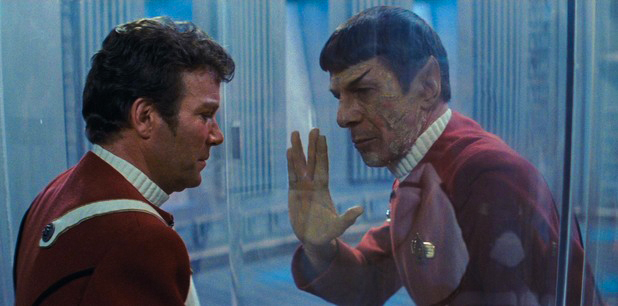
I've never been a diehard Trekkie, but this installment in the Star Trek franchise has long occupied a spot on my list of all-time favorite sci-fi movies. It also happens to be a movie that will always make me cry, when it — 33-year-old spoiler alert! — ends with the death of Spock (Leonard Nimoy).
I generally start to tear up around the time Spock and his captain and best friend, James Kirk (William Shatner), say their final goodbye. As Spock tells Kirk he has been, and always will be, his friend, his calm logic in the face of death is the perfect contrast to Kirk's outsized grief — a microcosm of the stark differences that make them such a masterful pairing.
The Week
Escape your echo chamber. Get the facts behind the news, plus analysis from multiple perspectives.

Sign up for The Week's Free Newsletters
From our morning news briefing to a weekly Good News Newsletter, get the best of The Week delivered directly to your inbox.
From our morning news briefing to a weekly Good News Newsletter, get the best of The Week delivered directly to your inbox.
But the waterworks don't really start until Spock's funeral (3:45 in the above clip). Today, Shatner is often regarded as a bit of a ham, but I dare anyone who's skeptical about his acting chops to watch how beautifully he carries those final scenes of Wrath of Khan. As Kirk delivers Spock's eulogy, he reaches the final line: "Of my friend, I can only say this. Of all the souls I have encountered in my travels, his was the most… human." In that brief, choked pause, as he searches for the highest compliment he can muster before settling on the word "human," I can feel Kirk's heart breaking — and my heart breaks along with him.
Even the knowledge that the franchise brought Spock back to life just two years later, in the very next Star Trek movie, doesn't diminish the impact of those scenes. It might sound blasphemous to fans who went on to enjoy Kirk and Spock's many, many other adventures together, but in my mind, this is where the original Star Trek franchise ends: with Kirk, sadder and wiser, flying off to carry out his beloved friend's legacy by seeking out new life and new civilizations. —Scott Meslow, entertainment editor and film and television critic.
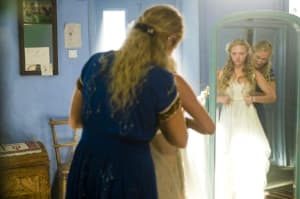
A free daily email with the biggest news stories of the day – and the best features from TheWeek.com
I may not be a part of the disco generation, but from the moment I first heard an ABBA song (admittedly, one covered by a teen pop group and played on the Disney Channel) 16 years ago, I was hooked. When the movie Mama Mia! came out a decade later, I was thrilled.
I watched it with my mom — cuddled up in the basement of our old house — before I left for college. The scene that got me then — and still does today — is the one before Sophie's wedding. Sophie (Amanda Seyfried) and her mom, Donna (Meryl Streep), have just gotten into a fight and Donna, stepping timidly into her daughter’s room, tries to make amends. While combing her daughter’s hair and helping her get dressed, Donna sings a heartbreaking song about their relationship and life together.
Do I really see what's in her mindEach time I think I'm close to knowingShe keeps on growingSlipping through my fingers all the time
Those lyrics perfectly capture the mother-daughter bond, one that oscillates between a special closeness and necessary distance. Sophie and Donna's relationship reminds me so much of the one I share with my own mom. Even now, I can barely type the lyrics without welling up a bit. And of course when I saw one of the musical's final performances on Broadway, well, you can imagine the waterworks. —Stephanie Talmadge, digital production assistant
3. The Lord of the Rings: The Return of the King

(YouTube)
"Courage, Merry. Courage for our friends." These words, spoken softly by Eowyn to her riding companion, Merry, as they quail before Sauron's hordes gathered on the Pelennor Fields, are nothing like the apocalyptic battle cry that King Theoden utters shortly afterward to rally his horsemen: "Ride! Ride to ruin and the world's ending!" Theoden and his Riders of Rohan exult in the doom they believe awaits them — "Death!" he then bellows, and "Death!" they respond — as if naming their great fear will give them the bravery to charge headlong toward it.

But there is something about Eowyn's whispered invocation of courage that is more stirring than the king's exhortation, and always puts a knot in my throat. This is partly because courage, of all the virtues, is rarer than kindness or love. It is also because she summons this gallantry "for our friends," making it an act of selflessness, rather than one of mere survival or of battlefield glory. But what is most affecting about Eowyn's sentiment — one that is visibly echoed by Sam in Shelob's lair, and Gandalf in his own solitary foray into the Pelennor Fields — is that it suggests courage is, if not quite the scourge of death, then the apotheosis of life: the pale flame coaxed in the face of so much darkness. —Ryu Spaeth, deputy editor
4. Pee-Wee’s Playhouse Christmas Special
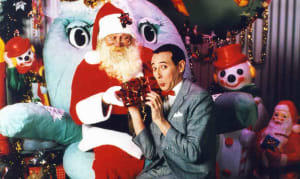
Every holiday season, my father digs out Pee-Wee's Playhouse Christmas Special and demands that the entire family sit down to watch. We do so with eye rolls and groans — all of us now dignified adults — although each of us, I believe, still secretly enjoys the tradition.
Pee-Wee’s Playhouse Christmas Special came out during the 1988 Writers Guild of America strike. It was one of only three episodes the show produced that year and the primetime special was a star-studded event, featuring the likes of Little Richard, Cher, Magic Johnson, Annette Funicello, Whoopi Goldberg, Joan Rivers, Oprah Winfrey, and more. Every time we watch, some family member will remark on the passing of yet another cast member or marvel at their youthful looks, just as we all grow older, too.
While Pee-Wee's takeaway never changes — Christmas is about giving, not getting — mine has shifted over the years. Watching Pee-Wee's Playhouse Christmas Special marks one more year gone by. As a result, Pee-Wee, for me, is about mortality — the preciousness of every moment — and how, while we might roll our eyes and complain when my dad gets out the tape, for the 49 minutes Pee-Wee puts on his show, we are all together. —Jeva Lange, staff writer
5. Contact
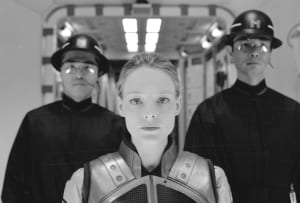
Contact, based on Carl Sagan's novel of the same name, is a terrific adventure. Ellie Arroway (Jodie Foster) is a scientist who discovers a transmission from another planet, deciphers it, helps build the transportation device encoded within the message, travels to meet an alien civilization, and has her entire conception of existence upended. And yet... the movie treats its central themes — Arroway's pugnacious atheism, and the tension between materialist rationalism and religious faith — with all the subtlety of a sledgehammer.
In the climactic scene [Spoilers!], Arroway is presented with evidence that her journey never happened and that she hallucinated the whole thing. Yet she refuses to back down. And despite the filmmakers' total failure to capitalize on the idea of subtext, the reversal is sort of brilliant: Suddenly Arroway is the faith-driven proselytizer who will not succumb to reductive secular reason.

Contact came out the same summer I went to space camp in Huntsville, Alabama, where we were treated to a "history of the universe" lecture by a theoretical physicist. In a reversal of the standard (and shallow) notion that science pulls people away from religion, I realized I could not conceive of this cosmological sweep without God. Contact arrived at the perfect time for my teenage self, and I wept like a child at the end. —Jeff Spross, business and economics correspondent
6. The Artist
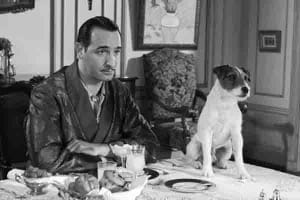
In this ode to the silent-film era, the central relationship, between an actor and his ingénue, hits all the heart-tugging rom-com tropes — a swooning meet-cute, the sudden and seemingly insurmountable obstacle, a near-tragedy, the sweet reunion, a prideful misunderstanding, and then, finally, the swelling happy ending. Blah, blah, blah.
My tears aren't for this relationship, but rather for the love between a man and his dog. In the movie, silent-film star George Valentin (Jean Dujardin) and his dog (played unforgettably by Uggie, R.I.P.) are faithful, constant companions. The dog costars in George's films, eases tensions with his spiteful wife, saves him from an ill-timed kiss, comforts him when his career and marriage fall apart, rescues him from certain death, and nurses him back to health.
The scene that brought me to double-breath-blubbering tears (in the movie theater, no less) was when George, facing his darkest hour, considers ending it all and the dog, realizing something's not right, does everything he can — barks wildly, jumps on his master's knee, nudges his leg, and circles around the chair — to save his best friend (for a second time). You don't need to hear the sound of his unrelenting barks to feel his desperate grief. That unwavering loyalty just breaks my heart because it's the truth — dogs are awesome like that. —Lauren Hansen, executive editor of multimedia
7. Frozen

I saw Frozen in the theater without knowing much about it. As the movie progressed, I saw parallels between Anna and Elsa, the sisters in the film, and my own sister, Eleanor, and I. Like Elsa, I was often a stand-offish older sister who didn't get along with my younger sibling (unlike Elsa, however, I do not posses the power to create eternal winter). And like Anna and Elsa at the end of the film, Eleanor and I have also been able to mend our relationship and are now completely enamored with each other.

Watching the movie, and seeing Anna's loneliness and attempts to reach out to her sister, made me feel rueful of all the years I inadvertently made my own sister feel shut out. Still, I managed to hold it together until near the end, when Anna saves Elsa's life, and, by extension, their kingdom. Calling my sister afterwards, I told her I wanted to take her to see Frozen when I returned home for Christmas. Sure enough, while sitting with my sister by my side, upon hearing the opening refrain of Anna singing "Do You Want to Build a Snowman?" I was a puddle. —Marshall Bright, digital production assistant
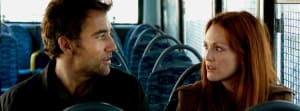
)
Children of Men has an extremely bleak premise: What would happen if people could no longer reproduce? Its answer is a plausible one: Facing demographic collapse and fiscal crises, most world nations tear themselves apart, with only Britain surviving under an anti-immigrant police state.
The film follows Theo Faron (Clive Owen), a nihilistic British bureaucrat who is summoned by his ex-wife to protect a pregnant refugee, Kee (Clare-Hope Ashitey). Naturally, a lot of political backstabbing commences as various factions fight for control of the world's only fetus. Faron and Kee are forced to run with the faint hope of connecting with a group of offshore scientists. It's a sickening and highly realistic portrait of petty human squabbling with extinction literally on the line. But in the penultimate scene, another side of human nature emerges, as soldiers and rebel guerillas, who had been murdering each other mere moments before, are struck dumb by the crying of Kee's baby. What can I say? I cried, too. —Ryan Cooper, national correspondent